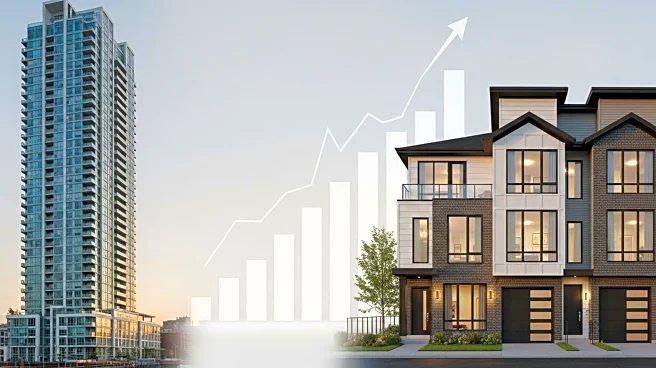What is the story about?
What's Happening?
Condos and townhouses have emerged as popular alternatives to single-family homes, offering affordability and reduced maintenance. Over the past decade, both property types have shown significant equity gains, with townhouses slightly outperforming condos as buyers seek 'house-like' living without the higher price tag of detached homes. Regional trends indicate varying appreciation rates, with condos leading in more affordable areas like the Midwest and South, while townhouses excel in higher-cost regions such as the Northeast and West. Townhouses offer steady growth potential due to land ownership and fewer restrictions, while condos remain strong investments in urban markets with high demand.
Why It's Important?
The appreciation of condos and townhouses reflects broader housing market dynamics influenced by affordability challenges and changing buyer preferences. As these property types continue to gain equity, they offer viable investment opportunities for individuals seeking to enter the real estate market. The trend towards townhouses in high-cost areas suggests a shift in consumer priorities, emphasizing the importance of land ownership and lower HOA fees. For investors and homeowners, understanding these trends is crucial for making informed decisions about property purchases and maximizing long-term returns.
What's Next?
As the housing market evolves, potential buyers and investors may increasingly consider condos and townhouses as strategic investments. The demand for these properties could lead to further development and innovation in design and amenities, catering to diverse buyer needs. Real estate professionals and policymakers may focus on addressing affordability challenges and supporting sustainable growth in these sectors. Additionally, the impact of hidden costs such as maintenance expenses and special assessments will continue to be a critical factor in property ownership decisions.
Beyond the Headlines
The rise in popularity of condos and townhouses highlights cultural shifts in homeownership preferences, with more individuals seeking flexible living arrangements that balance affordability and lifestyle. This trend may influence urban planning and development strategies, encouraging the creation of mixed-use communities that integrate residential, commercial, and recreational spaces. As the market adapts, there may be increased emphasis on sustainable building practices and community engagement, shaping the future of residential real estate.


















